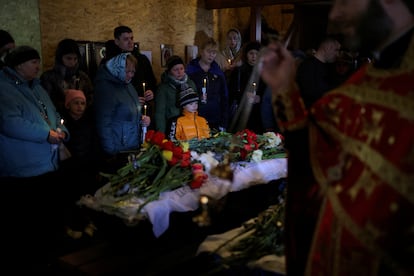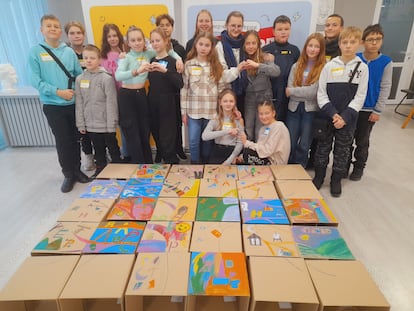Ukraine battles to protect children’s mental health
More than a million minors affected by the war are at risk of depression and post-traumatic stress. Public and private initiatives are trying to rebuild networks to help them


Anastasia, 11, has just put the final touches on a drawing on a cardboard box. “I used green because it represents life, nature, and white because it represents spirit and freedom,” says the student from Lyceum No. 15 in Chernihiv, in the north of Ukraine, just a stone’s throw away from Ukraine’s border with Belarus and Russia. When describing her art, Anastasia radiates maturity beyond her age, but her reflections don’t stop there. She lives in one of the first regions to be attacked by Moscow when it launched its offensive in February 2022. Even today, Chernihiv is a regular target of Russia’s deadly bombing. “War is something that destroys,” she says from the Chernihiv Palace of Culture. “This helps ease my mind because it is difficult to endure.” Her childhood, Ukraine’s childhood, is hurt and seriously so. And that requires a response.
Along with Anastasia, about 20 children between the ages of 11 and 12 are taking part in a class run by the Dobrodiiv Club Foundation in the social center, a symbol of the old Soviet cultural identity. The goal of the class is to offer a safe space for socio-emotional support to minors affected by the war. Anastasia explains it better. “It helps the group develop,” she says. “It is an extra activity that allows us to spend time together.” The children gather their painted boxes to form a cardboard tree on the ground. Helping the students is Tetiana Yefimenko, 36, dressed in a white coat. “Each child feels like they are part of Ukraine,” she explains, “the puzzle will not be completed if one of them is missing.” The session aims to bring the children together, but also to allow them to express themselves and relate like children. “It is important in times of war,” adds Angelina Fedoriy, 25, a collaborator on the project, “it gets them very involved.”
According to a 2023 report by Dobrodiiv Club and the organization Plan International, almost 40% of teenagers fear for their life and health, as well as that of their loved ones, because of the war in Ukraine. The survey — which interviewed youngsters between 13 and 19 years of age — found that 87% of respondents had experienced the greatest changes they remember due to the Russian invasion. But nine out of 10 — nearly all the respondents — said they wanted to help in the rebuilding of Ukraine. Indeed, since the start of the conflict, many youngsters have played a role through volunteering, which also serves as therapy. The report came to two conclusions: minors are very vulnerable victims of the conflict, but also key actors in the country’s defense.
Kids are still kids, and drawing continues to channel their childhood. Milana, 12, says a South Korean music band called Black Pink is the inspiration of her work. That’s why, she says — very seriously pushing aside a friend who is bothering her — her picture on the cardboard box uses the colors black and pink. “I had a good time, I don’t know how to draw,” she admits openly, “and it seems that I have learned something.” As for the war, it’s pushed to the sidelines. “This helps us, I’d forgotten it during this time.” She admits she doesn’t like talking about the war, and changes the subject.

The results of the Dobrodiiv Club study led the foundation to open spaces in cities such as Chernihiv and Mykolaiv, in the south, and Kyiv, the capital. Since October, thousands of children have taken part in their activities. UNICEF, the U.N. children’s fund, estimates that around 1.5 million children in Ukraine are at risk of depression, anxiety, post-traumatic stress disorder — 26%, according to U.N. data — and other mental health problems. The reasons seem clear: violence, displacement from their homes and social upheaval (education, health, living conditions...) which, in the end, destroy one of the hallmarks of childhood, the feeling of being protected.
Plan International, which has worked with more than 250,000 Ukrainian minors, warns of the war’s impact on children’s mental health: “Many have a very high sensitivity to loud sounds, insomnia, fear of leaving the house due to landmines and attacks, constant stress and anguish about family and friends who are on the front and adaptation problems in host countries.” In a report published by Plan International last summer, minors and young people expressed the need for free psychosocial support services.
The U.N. is already working with the Ukrainian Ministry of Education and Science to improve mental health in classrooms through different projects, including training up to 15,000 psychologists during this school year. There are more initiatives, such as the How Are You? program launched by Olena Zelenska, wife of Ukrainian President Volodymyr Zelenskiy, as well as hotlines run by the organizations such as La Strada, Voice of Children and Teenergizer.
Artem, 12, is a little more shy than his classmates in this classroom at the Chernihiv Palace of Culture. In general, the boys are more distracted than the girls. As soon as they feel that their work is finished, they pick up their cellphone to play video games. In Artem’s picture, you can see the outline of something that looks like a mountain range. “I draw this,” he says, “because I would like to go to the mountains.” Up until then, he sounds like a child, but then comes the preteen from an invaded country. “This is how we love our country more; it is desire and love for freedom. Ukraine cares about us, for us to develop and find a calling.”
Death toll
Artem is timid, but he admits that sometimes he talks to his friends about the war and that it sometimes scares them. With good reason. According to the latest figure from the Ukrainian Prosecutor General’s Office, 526 children have died due to the Russian invasion. And another 1,200 have been injured. In each of its updates, the office warns that the figures are provisional because it does not have detailed information on the victims in occupied or disputed territory. The United Nations mission in Ukraine raises the number of children killed to 579, most between the ages of 12 and 17.
In Chernihiv, a city with more than 10 centuries of history, which was home to 285,000 inhabitants before the war, hundreds of minors have been killed or injured since February 24, 2022. The most recent victim was six-year-old Sofia. She died on August 19 after a Russian missile struck Taras Shevchenko theater, which is located in an open square in the center of the city. Some believe the target of the attack was a small drone fair that was being held that day, albeit discreetly.
Attacks like the one in August mean that even a help session for minors is treated with great caution. Zlata is 12 years old. She was taking drawing classes before the Russian invasion, but with the war she had to stop. She moved with her family to Ivano-Frankivsk, in the southwest of the country. They returned to Chernihiv last summer. While she is chatting, Zhenia, 11, and Veronika, 12, come up to her. The three girls share that it’s not normal for children their age to be experiencing something like this. “It has a big effect on our psychological state,” says Zlata. The situation is so terrifying, it can bring tears to their eyes. “Especially when there are explosions,” she continues. That’s understandable. What’s less understandable is what Veronika shared. She lived in an occupied area and was upset that there were people who believed that nothing was happening. “They thought that it wasn’t so terrible,” she says. That has also been changing.
But at the end of the day, they are children, and they can find the positive in anything. Zlata grabs Zhenia before leaving. “At least thanks to this, we have met,” she tells her.
Sign up for our weekly newsletter to get more English-language news coverage from EL PAÍS USA Edition
Tu suscripción se está usando en otro dispositivo
¿Quieres añadir otro usuario a tu suscripción?
Si continúas leyendo en este dispositivo, no se podrá leer en el otro.
FlechaTu suscripción se está usando en otro dispositivo y solo puedes acceder a EL PAÍS desde un dispositivo a la vez.
Si quieres compartir tu cuenta, cambia tu suscripción a la modalidad Premium, así podrás añadir otro usuario. Cada uno accederá con su propia cuenta de email, lo que os permitirá personalizar vuestra experiencia en EL PAÍS.
¿Tienes una suscripción de empresa? Accede aquí para contratar más cuentas.
En el caso de no saber quién está usando tu cuenta, te recomendamos cambiar tu contraseña aquí.
Si decides continuar compartiendo tu cuenta, este mensaje se mostrará en tu dispositivo y en el de la otra persona que está usando tu cuenta de forma indefinida, afectando a tu experiencia de lectura. Puedes consultar aquí los términos y condiciones de la suscripción digital.








































